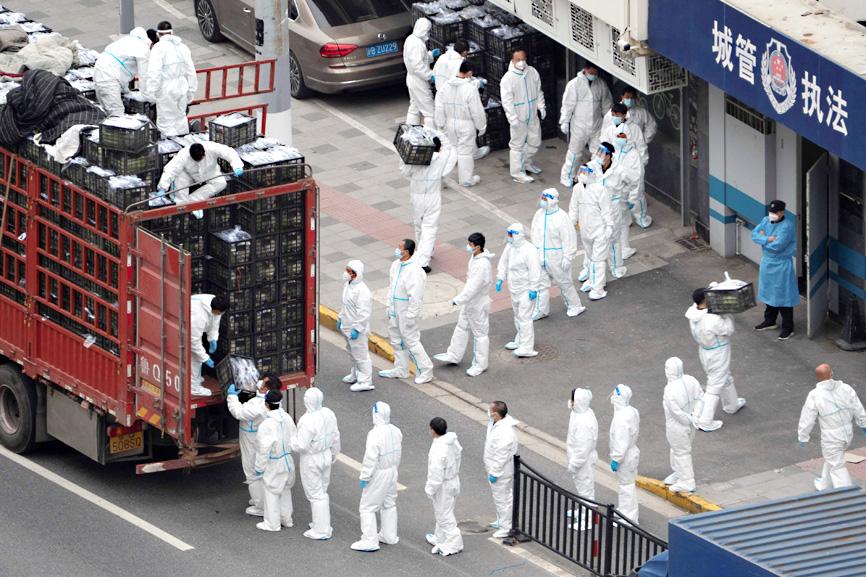Tesla Inc’s factory shutdown has stretched out to at least 12 days, much-needed semiconductors are piling up at manufacturers amid a shortage of truck drivers and bankers are camping in their offices as Shanghai’s COVID-19 lockdown disrupts businesses in the city.
The lockdowns and virus containment measures threaten to slow the nation’s economic growth this year to below the Chinese government’s 5.5 percent target, Bloomberg Economics said.
They also risk further havoc on already stressed global supply chains, with companies from chip giant Semiconductor Manufacturing International Corp (SMIC, 中芯國際) to a South Korean noodle maker caught up in the fallout.

Photo: AFP
Electric vehicle pioneer Tesla on Tuesday told some suppliers and workers that its Shanghai factory — which has been shuttered since the city went into a phased lockdown on Monday last week — would remain closed at least through today, people familiar with the matter said.
Following a separate two-day shutdown last month, Tesla has now lost 12 days of production in the past few weeks, including the Tomb Sweeping Day break.
The first Tesla Gigafactory outside the US produced half of the company’s vehicles last year. It produces not just for the lucrative Chinese market, but for export to Europe and elsewhere in Asia.
Some tech companies, including chip giants Taiwan Semiconductor Manufacturing Co (台積電) and SMIC, as well as iPhone assembler Pegatron Corp (和碩) have kept plants running by implementing a so-called closed-loop system where workers live on-site and are tested regularly.
Shanghai initially launched its two-stage lockdown starting with its eastern districts for five days, then its western districts for five days. It had been scheduled to be lifted on Tuesday.
The lockdown has since been extended to cover the entire city indefinitely.
Taiwanese businesses in Shanghai said they were making adjustments to continue operating amid the lockdown, but warned that severe logistics problems there could derail their efforts, the Central News Agency reported on Monday.
In Kunshan, which is under lockdown until tomorrow, many factories have “distributed sleeping bags” to employees and are having them work in shifts to meet production deadlines.
Still, the situation is likely to take an economic toll, an industry source said, especially among Taiwanese printed circuit board manufacturers, whose production capacity is heavily concentrated in Kunshan.
Kunshan factories account for 60 percent of the capacity of Taiwan’s Dynamic Electronics Co (定穎電子), 50 percent of the capacity of Flexium Interconnect Inc (台郡科技), 40 percent of the capacity of Nan Ya Printed Circuit Board Corp (南亞電路板), 25 percent of the capacity of Elite Material Co (EMC, 台光電子材料) and 20 percent of the capacity of Unimicron Technology Corp (欣興電子), a source said.
Of those companies, Nan Ya PCB, EMC and Unimicron have all halted operations during the lockdown, while others had already scheduled closures for Tomb Sweeping Day, thus limiting the impact on their operations, the source said.
South Korean companies are also being affected, with operations at the Shanghai plants of noodle maker Nongshim Co, confectionery manufacturer Orion Corp and cosmetics producer Amorepacific Corp suspended.
Singapore’s Spindex Industries Ltd (事必得工業), which supplies precision components used by the automobile industry, has extended the closure of its Shanghai plant until Sunday or whenever local authorities allow work to resume.
Additional reporting by CNA

Shiina Ito has had fewer Chinese customers at her Tokyo jewelry shop since Beijing issued a travel warning in the wake of a diplomatic spat, but she said she was not concerned. A souring of Tokyo-Beijing relations this month, following remarks by Japanese Prime Minister Sanae Takaichi about Taiwan, has fueled concerns about the impact on the ritzy boutiques, noodle joints and hotels where holidaymakers spend their cash. However, businesses in Tokyo largely shrugged off any anxiety. “Since there are fewer Chinese customers, it’s become a bit easier for Japanese shoppers to visit, so our sales haven’t really dropped,” Ito

The number of Taiwanese working in the US rose to a record high of 137,000 last year, driven largely by Taiwan Semiconductor Manufacturing Co’s (TSMC, 台積電) rapid overseas expansion, according to government data released yesterday. A total of 666,000 Taiwanese nationals were employed abroad last year, an increase of 45,000 from 2023 and the highest level since the COVID-19 pandemic, data from the Directorate-General of Budget, Accounting and Statistics (DGBAS) showed. Overseas employment had steadily increased between 2009 and 2019, peaking at 739,000, before plunging to 319,000 in 2021 amid US-China trade tensions, global supply chain shifts, reshoring by Taiwanese companies and

Taiwan Semiconductor Manufacturing Co (TSMC) Chairman C.C. Wei (魏哲家) and the company’s former chairman, Mark Liu (劉德音), both received the Robert N. Noyce Award -- the semiconductor industry’s highest honor -- in San Jose, California, on Thursday (local time). Speaking at the award event, Liu, who retired last year, expressed gratitude to his wife, his dissertation advisor at the University of California, Berkeley, his supervisors at AT&T Bell Laboratories -- where he worked on optical fiber communication systems before joining TSMC, TSMC partners, and industry colleagues. Liu said that working alongside TSMC

TECHNOLOGY DAY: The Taiwanese firm is also setting up a joint venture with Alphabet Inc on robots and plans to establish a firm in Japan to produce Model A EVs Manufacturing giant Hon Hai Precision Industry Co (鴻海精密) yesterday announced a collaboration with ChatGPT developer OpenAI to build next-generation artificial intelligence (AI) infrastructure and strengthen its local supply chain in the US to accelerate the deployment of advanced AI systems. Building such an infrastructure in the US is crucial for strengthening local supply chains and supporting the US in maintaining its leading position in the AI domain, Hon Hai said in a statement. Through the collaboration, OpenAI would share its insights into emerging hardware needs in the AI industry with Hon Hai to support the company’s design and development work, as well